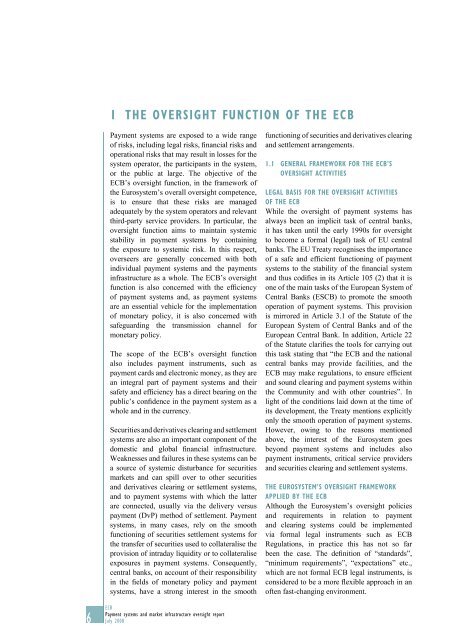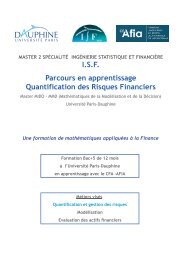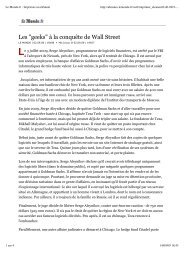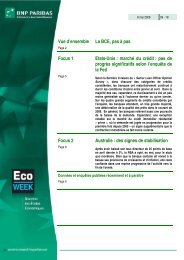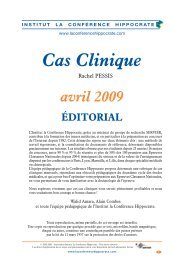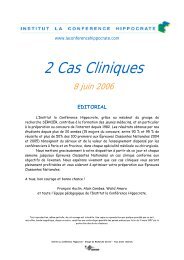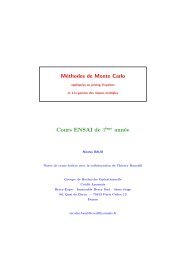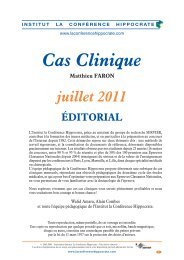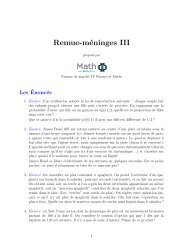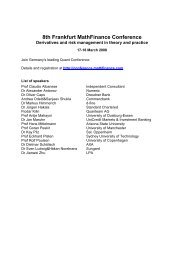Payment systems and market infrastructure oversight ... - Maths-fi.com
Payment systems and market infrastructure oversight ... - Maths-fi.com
Payment systems and market infrastructure oversight ... - Maths-fi.com
You also want an ePaper? Increase the reach of your titles
YUMPU automatically turns print PDFs into web optimized ePapers that Google loves.
1 THE OVERSIGHT FUNCTION OF THE ECB<br />
<strong>Payment</strong> <strong>systems</strong> are exposed to a wide range<br />
of risks, including legal risks, <strong>fi</strong>nancial risks <strong>and</strong><br />
operational risks that may result in losses for the<br />
system operator, the participants in the system,<br />
or the public at large. The objective of the<br />
ECB’s <strong>oversight</strong> function, in the framework of<br />
the Eurosystem’s overall <strong>oversight</strong> <strong>com</strong>petence,<br />
is to ensure that these risks are managed<br />
adequately by the system operators <strong>and</strong> relevant<br />
third-party service providers. In particular, the<br />
<strong>oversight</strong> function aims to maintain systemic<br />
stability in payment <strong>systems</strong> by containing<br />
the exposure to systemic risk. In this respect,<br />
overseers are generally concerned with both<br />
individual payment <strong>systems</strong> <strong>and</strong> the payments<br />
<strong>infrastructure</strong> as a whole. The ECB’s <strong>oversight</strong><br />
function is also concerned with the ef<strong>fi</strong>ciency<br />
of payment <strong>systems</strong> <strong>and</strong>, as payment <strong>systems</strong><br />
are an essential vehicle for the implementation<br />
of monetary policy, it is also concerned with<br />
safeguarding the transmission channel for<br />
monetary policy.<br />
The scope of the ECB’s <strong>oversight</strong> function<br />
also includes payment instruments, such as<br />
payment cards <strong>and</strong> electronic money, as they are<br />
an integral part of payment <strong>systems</strong> <strong>and</strong> their<br />
safety <strong>and</strong> ef<strong>fi</strong>ciency has a direct bearing on the<br />
public’s con<strong>fi</strong>dence in the payment system as a<br />
whole <strong>and</strong> in the currency.<br />
Securities <strong>and</strong> derivatives clearing <strong>and</strong> settlement<br />
<strong>systems</strong> are also an important <strong>com</strong>ponent of the<br />
domestic <strong>and</strong> global <strong>fi</strong>nancial <strong>infrastructure</strong>.<br />
Weaknesses <strong>and</strong> failures in these <strong>systems</strong> can be<br />
a source of systemic disturbance for securities<br />
<strong>market</strong>s <strong>and</strong> can spill over to other securities<br />
<strong>and</strong> derivatives clearing or settlement <strong>systems</strong>,<br />
<strong>and</strong> to payment <strong>systems</strong> with which the latter<br />
are connected, usually via the delivery versus<br />
payment (DvP) method of settlement. <strong>Payment</strong><br />
<strong>systems</strong>, in many cases, rely on the smooth<br />
functioning of securities settlement <strong>systems</strong> for<br />
the transfer of securities used to collateralise the<br />
provision of intraday liquidity or to collateralise<br />
exposures in payment <strong>systems</strong>. Consequently,<br />
central banks, on account of their responsibility<br />
in the <strong>fi</strong>elds of monetary policy <strong>and</strong> payment<br />
<strong>systems</strong>, have a strong interest in the smooth<br />
functioning of securities <strong>and</strong> derivatives clearing<br />
<strong>and</strong> settlement arrangements.<br />
1.1 GENERAL FRAMEWORK FOR THE ECB’S<br />
OVERSIGHT ACTIVITIES<br />
LEGAL BASIS FOR THE OVERSIGHT ACTIVITIES<br />
OF THE ECB<br />
While the <strong>oversight</strong> of payment <strong>systems</strong> has<br />
always been an implicit task of central banks,<br />
it has taken until the early 1990s for <strong>oversight</strong><br />
to be<strong>com</strong>e a formal (legal) task of EU central<br />
banks. The EU Treaty recognises the importance<br />
of a safe <strong>and</strong> ef<strong>fi</strong>cient functioning of payment<br />
<strong>systems</strong> to the stability of the <strong>fi</strong>nancial system<br />
<strong>and</strong> thus codi<strong>fi</strong>es in its Article 105 (2) that it is<br />
one of the main tasks of the European System of<br />
Central Banks (ESCB) to promote the smooth<br />
operation of payment <strong>systems</strong>. This provision<br />
is mirrored in Article 3.1 of the Statute of the<br />
European System of Central Banks <strong>and</strong> of the<br />
European Central Bank. In addition, Article 22<br />
of the Statute clari<strong>fi</strong>es the tools for carrying out<br />
this task stating that “the ECB <strong>and</strong> the national<br />
central banks may provide facilities, <strong>and</strong> the<br />
ECB may make regulations, to ensure ef<strong>fi</strong>cient<br />
<strong>and</strong> sound clearing <strong>and</strong> payment <strong>systems</strong> within<br />
the Community <strong>and</strong> with other countries”. In<br />
light of the conditions laid down at the time of<br />
its development, the Treaty mentions explicitly<br />
only the smooth operation of payment <strong>systems</strong>.<br />
However, owing to the reasons mentioned<br />
above, the interest of the Eurosystem goes<br />
beyond payment <strong>systems</strong> <strong>and</strong> includes also<br />
payment instruments, critical service providers<br />
<strong>and</strong> securities clearing <strong>and</strong> settlement <strong>systems</strong>.<br />
THE EUROSYSTEM’S OVERSIGHT FRAMEWORK<br />
APPLIED BY THE ECB<br />
Although the Eurosystem’s <strong>oversight</strong> policies<br />
<strong>and</strong> requirements in relation to payment<br />
<strong>and</strong> clearing <strong>systems</strong> could be implemented<br />
via formal legal instruments such as ECB<br />
Regulations, in practice this has not so far<br />
been the case. The de<strong>fi</strong>nition of “st<strong>and</strong>ards”,<br />
“minimum requirements”, “expectations” etc.,<br />
which are not formal ECB legal instruments, is<br />
considered to be a more flexible approach in an<br />
often fast-changing environment.<br />
6<br />
ECB<br />
<strong>Payment</strong> <strong>systems</strong> <strong>and</strong> <strong>market</strong> <strong>infrastructure</strong> <strong>oversight</strong> report<br />
July 2008


